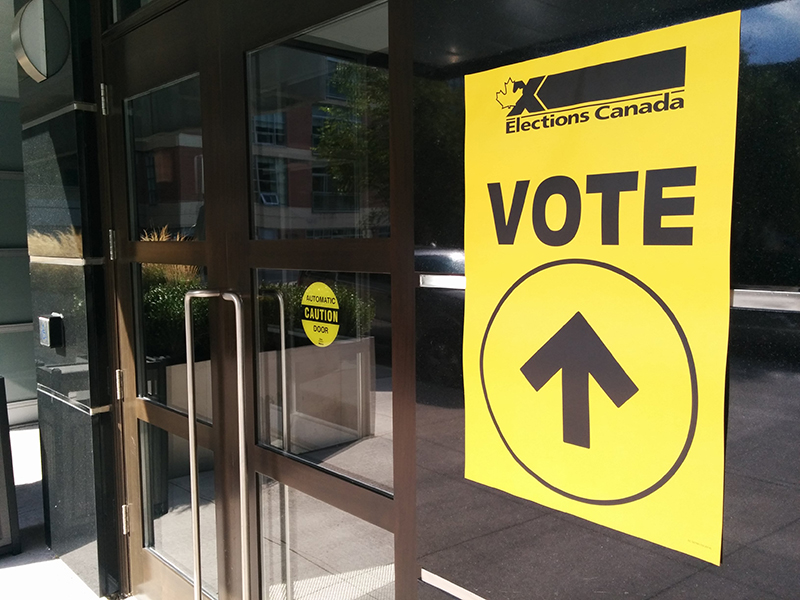In the lead-up to the recent federal election, many Jews were concerned that the conflict between the election date and the holiday of Shemini Atzeret would lead to a lower proportion of observant Jews turning out to vote.
After a concerted campaign by Jewish institutions to educate voters about their electoral options, and the opening of additional service points in ridings with large Jewish populations, Jewish candidates in those ridings were satisfied that the conflict did not hinder people from voting. However, some of the candidates believe the election date hindered their campaigns in other ways.
“My concern was not being able to ensure that we get out the other 80 per cent of the riding who would be able to vote on Shemini Atzeret, because you need an army of volunteers to do that,” said Chani Aryeh-Bain, an Orthodox woman and the Conservative candidate in Toronto’s Eglinton-Lawrence riding.
Around one-fifth of voters in that riding are Jewish, she said, and of those, about a quarter are observant. Aryeh-Bain took Elections Canada’s chief electoral officer to court over the summer, in an unsuccessful attempt to get the election date moved, arguing that it would affect both Jewish voters and her ability to campaign effectively.
“Naturally, if my volunteers are primarily coming from my own community, which is Orthodox, then they’re not going to be able to help out on Shemini Atzeret, and I myself can’t be there,” she said.
On a typical election day, a candidate and her volunteers knock on the doors of identified supporters and ensure that they get to the polls, Aryeh-Bain said. If the candidate can’t rustle up enough volunteers to cover the whole riding, it could put her at a disadvantage.
“You could be neck-and-neck in the polls with your opponents. The only thing that will put you over the top is if your ground game is great. And if you’re disadvantaged from that point of view that you can’t participate on election day, it doesn’t matter that there are other options to vote. Still, the lion’s share of people vote on election day,” she said.
Aryeh-Bain isn’t claiming that she would have won had the election fallen on another date. She does believe, however, that the final tally between herself and Marco Mendicino, the Liberal candidate who carried the riding, would not have been as large as the eventual 11,000-vote difference.
READ: HOW THE JEWISH VOTE WILL SHAPE CANADA’S 43RD PARLIAMENT
Anthony Housefather, the Jewish Liberal MP for the Montreal-area riding of Mount Royal, doesn’t believe the conflict affected the results in his riding, where his main competitor was Jewish Conservative candidate David Tordjman. Housefather ended up securing over 56 per cent of the vote, compared to 25 per cent for the second-place Tordjman. He pointed to preliminary polling data that shows that more people utilized the advanced polling options in areas of his riding with higher concentrations of Jews.
Housefather also said that if the Jewish community wanted the election date changed, the chief electoral officer should have been given more notice.
“The election is something that takes years to prepare. If the Jewish community, organizationally, we had all felt that it should have been moved, we should have approached the chief elections officer two years before the election, or more, and not in the six months leading up to the election. Because organizationally, that would have made it impossible,” he said.
He did, however, say that he would be in favour of changing the election law to allow for greater flexibility if such a conflict were to arise in the future.
“One of the other problems with the current law is … the deed can only be changed to two days. It either has to happen on Tuesday, the day after the Monday, or the week after, which in those cases could also be Jewish holidays,” he said. “Such as this case, where if the election was moved to Tuesday, it would have been Simchat Torah instead of Shemini Atzeret.”
Michael Levitt, the Jewish Liberal MP for Toronto’s York Centre riding, said he first raised the election day conflict when he wrote a letter in April asking for the date to be changed. He penned another in July to ensure there would be accessible voting options for Jewish voters, and said he will work to ensure a similar conflict does not occur again.
“I’ve committed to working with the minister of democratic institutions … to negate the possibility of this happening again,” he said. “That’s something that I take seriously. But I can tell you that in terms of the tools available to me as both a parliamentarian and a candidate, I believe I stood up and represented my community and I hold my head high on that.”
B’nai Brith Canada also attempted to get the election date moved and worked to educate Jewish voters on their options, when that attempt failed. In an emailed statement, Michael Mostyn, the organization’s CEO, said that without the validated Elections Canada statistics, it was too soon to determine whether voting was made adequately accessible for the Jewish community.
“We certainly did our best at B’nai Brith Canada to encourage members of the Jewish community to get out and vote in advance of the Oct. 21 election date that fell on Shemini Atzeret, and to raise awareness about the various advanced voting options that were available,” he added.
The Centre for Israel and Jewish Affairs (CIJA) also worked to get out the Jewish vote, including consulting with Elections Canada, said its CEO, Shimon Koffler Fogel, in a statement to The CJN.
“We should never be in a situation again where an election date conflicts with Jewish holidays. That’s why CIJA will continue to advocate in favour of changing the Canada Elections Act so that the fixed date of the federal election no longer coincides with the High Holiday period.”
